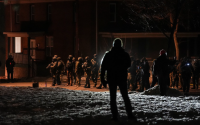Common Dreams / Published on Wednesday, April 13, 2005 by the New York TimesScott Shane
Hundreds of newly released cables that John D. Negroponte sent to Washington while serving as ambassador to Honduras in the 1980's show that he played a more central and assertive role than previously known in managing the United States' covert war against Nicaragua's leftist government, which he called "our special project."
The cables show that Mr. Negroponte worked closely with William J. Casey, then director of central intelligence, on the Reagan administration's anti-Communist offensive in Central America. He helped word a secret 1983 presidential "finding" authorizing support for the contras, as the Nicaraguan rebels were known, and met regularly with Honduran military officials to win and retain their backing for the covert action, the documents show.
The cables add details to the public picture of Mr. Negroponte, President Bush's nominee to be the first director of national intelligence, as a tough cold warrior who enthusiastically carried out President Ronald Reagan's strategy. They show he sent admiring reports to Washington about the Honduran military chief, who was blamed for human rights violations, warned that peace talks with the Nicaraguan regime might be a dangerous "Trojan horse" and pleaded with officials in Washington to impose greater secrecy on the Honduran role in aiding the contras.
The documents, part of Mr. Negroponte's State Department file, were declassified at Mr. Negroponte's request in 1998 and made public as a result of a Freedom of Information Act request from The Washington Post, which reported on them Tuesday. They were posted by the National Security Archive, a private research group at George Washington University, on its Web site a few hours before Mr. Negroponte's Senate confirmation hearing Tuesday.
The documents appear to lend some support to the contention of Mr. Negroponte's critics that he did little to protest human rights abuses by Honduran military units blamed for abductions, torture and murder. Mr. Negroponte and some of his fellow diplomats have maintained that he worked behind the scenes against such abuses, but the cables make few references to the issue.
In fact, after a meeting in October 1983 with the head of the Honduran military, Gen. Gustavo Álvarez Martínez, who was widely held responsible for human rights abuses at the time, Mr. Negroponte reported to Washington that General Álvarez was misunderstood.
Remarks General Álvarez made to him during a plane ride were "reflective of his commitment to constitutional government," Mr. Negroponte reported. The general's critics, he wrote, were misled by "a stereotype" or "sheer ignorance." About six months later General Álvarez was forcibly removed from power by other military officers who accused him of dictatorial tendencies, a move that took American officials by surprise.
At Mr. Negroponte's confirmation hearing Tuesday, Senator Ron Wyden, Democrat of Oregon, said that even though the events in Honduras took place more than 20 years ago, Mr. Negroponte's record there raised questions about his suitability for the new job.
Mr. Wyden said Mr. Negroponte's failure to highlight human rights abuses suggested a tendency to shade his reporting to suit presidential policies.
"It looks like to me you saw things through an administration-colored lens," Mr. Wyden said. "I hope you can convince me that when you brief the president, the president is going to get all the facts."
Mr. Negroponte vigorously defended his record in Honduras. "I certainly believe that my comportment was always absolutely legal and entirely professional," he said.
Senator Pat Roberts, the Kansas Republican who is chairman of the Senate Intelligence Committee, dismissed the questions about Honduras as "an issue of 25 years ago" with little relevance to the intelligence job.
Senator Orrin G. Hatch, Republican of Utah, noted that Mr. Negroponte and his wife adopted five Honduran children, which he said showed his "compassion" for the Honduran people.
Peter Kornbluh, a Latin America specialist at the National Security Archive who edited the documents for the Web and wrote accompanying comments, said he believes the documents show Mr. Negroponte was "not an honest broker" in reporting on Honduras.
"This is a truly see-no-evil, hear-no-evil attitude," Mr. Kornbluh said.
The cables suggest that on occasion, Mr. Negroponte's brazenness in pursuing what was supposed to be a covert action raised eyebrows among his diplomatic colleagues.
In one message to Mr. Negroponte, the American ambassador to Nicaragua, Anthony Quainton, gently scolded him for playing host to Adolfo Calero, political leader of the contras, at a dinner in Tegucigalpa, the Honduran capital.
Mr. Quainton wrote, "I have my doubts about a dinner at the residence for a man who is in the business of overthrowing a neighboring government."






